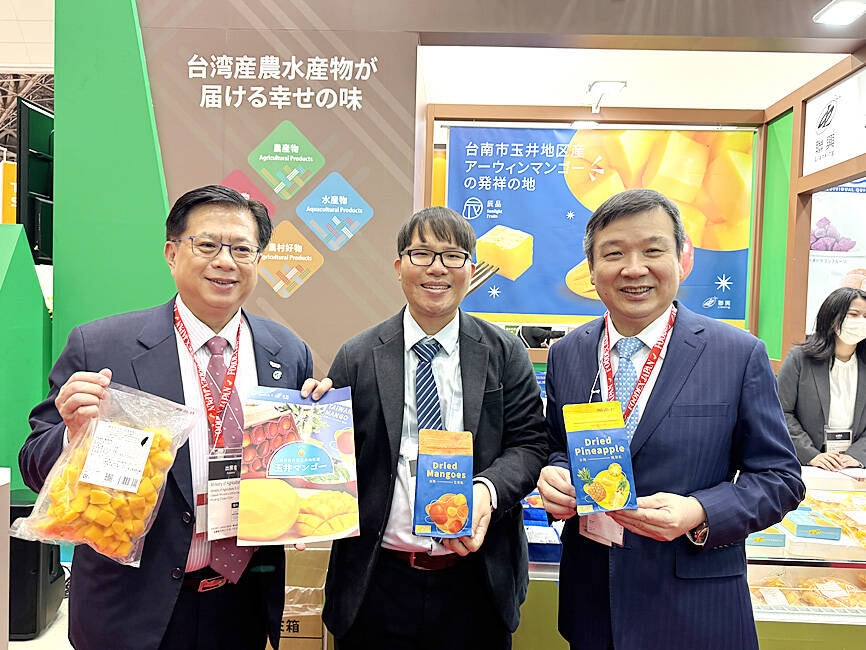Japan was one of the top three destinations for Taiwanese agricultural exports for the past three years, the Ministry of Agriculture said yesterday at the opening of Foodex Japan, Asia’s largest food trade show.
Ministry data showed that key exports to Japan from 2022 to last year included frozen tuna, orchids and other live flowers, as well as feathers and down.
Frozen tuna shipments to Japan consistently accounted for more than half of Taiwan’s annual tuna exports during that period, while orchids and live flowers made up 14 to 18.4 percent, and feathers and down ranged from 5.6 to 17.7 percent, the ministry said.

Photo: CNA
Conversely, Taiwan’s top agricultural imports from Japan over the past three years included fresh chilled beef, which accounted for 9.4 to 13.1 percent of the nation’s total beef imports.
In addition, Japanese alcoholic beverages ranked among Taiwan’s top imports in 2022, accounting for 9.5 percent of total imports in that category, the ministry said.
Last year, fresh chilled apples ranked ninth among Taiwan’s agricultural imports, with Japan accounting for 23.9 percent of total apple imports, after the US and New Zealand.
Taiwan’s agricultural exports to Japan totaled US$856 million in 2022, representing 16.3 percent of overall agricultural exports and marking an 11 percent annual increase.
However, in 2023, exports declined 16 percent to US$719 million, accounting for 14.7 percent of total exports.
Last year, Japan ranked as Taiwan’s third-largest agricultural export market, with exports falling 10 percent to US$648 million, behind the US with US$887 million, or 18 percent, and China, with US$747 million, or 15.2 percent, ministry data showed.
The ministry attributed the decline to global inflation, rising interest rates and the depreciation of the yen, adding that higher global grain prices also constrained Japan’s overall import capacity.

TAKING STOCK: A Taiwanese cookware firm in Vietnam urged customers to assess inventory or place orders early so shipments can reach the US while tariffs are paused Taiwanese businesses in Vietnam are exploring alternatives after the White House imposed a 46 percent import duty on Vietnamese goods, following US President Donald Trump’s announcement of “reciprocal” tariffs on the US’ trading partners. Lo Shih-liang (羅世良), chairman of Brico Industry Co (裕茂工業), a Taiwanese company that manufactures cast iron cookware and stove components in Vietnam, said that more than 40 percent of his business was tied to the US market, describing the constant US policy shifts as an emotional roller coaster. “I work during the day and stay up all night watching the news. I’ve been following US news until 3am

UNCERTAINTY: Innolux activated a stringent supply chain management mechanism, as it did during the COVID-19 pandemic, to ensure optimal inventory levels for customers Flat-panel display makers AUO Corp (友達) and Innolux Corp (群創) yesterday said that about 12 to 20 percent of their display business is at risk of potential US tariffs and that they would relocate production or shipment destinations to mitigate the levies’ effects. US tariffs would have a direct impact of US$200 million on AUO’s revenue, company chairman Paul Peng (彭雙浪) told reporters on the sidelines of the Touch Taiwan trade show in Taipei yesterday. That would make up about 12 percent of the company’s overall revenue. To cope with the tariff uncertainty, AUO plans to allocate its production to manufacturing facilities in

Six years ago, LVMH’s billionaire CEO Bernard Arnault and US President Donald Trump cut the blue ribbon on a factory in rural Texas that would make designer handbags for Louis Vuitton, one of the world’s best-known luxury brands. However, since the high-profile opening, the factory has faced a host of problems limiting production, 11 former Louis Vuitton employees said. The site has consistently ranked among the worst-performing for Louis Vuitton globally, “significantly” underperforming other facilities, said three former Louis Vuitton workers and a senior industry source, who cited internal rankings shared with staff. The plant’s problems — which have not

COLLABORATION: Given Taiwan’s key position in global supply chains, the US firm is discussing strategies with local partners and clients to deal with global uncertainties Advanced Micro Devices Inc (AMD) yesterday said it is meeting with local ecosystem partners, including Taiwan Semiconductor Manufacturing Co (TSMC, 台積電), to discuss strategies, including long-term manufacturing, to navigate uncertainties such as US tariffs, as Taiwan occupies an important position in global supply chains. AMD chief executive officer Lisa Su (蘇姿丰) told reporters that Taiwan is an important part of the chip designer’s ecosystem and she is discussing with partners and customers in Taiwan to forge strong collaborations on different areas during this critical period. AMD has just become the first artificial-intelligence (AI) server chip customer of TSMC to utilize its advanced